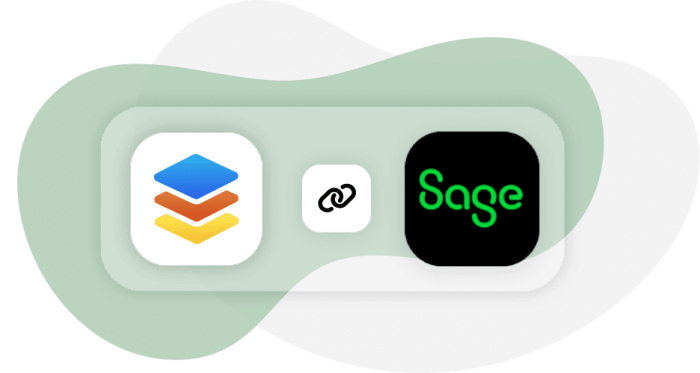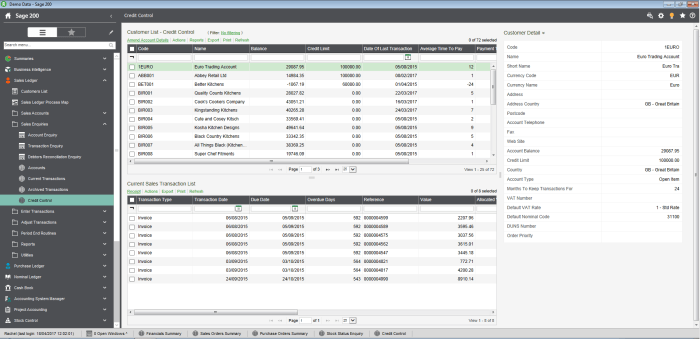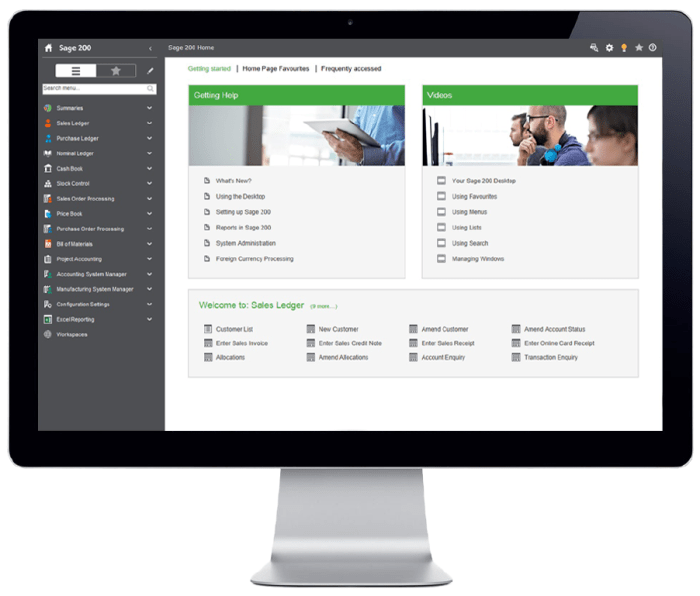MAS 200 Sage Software represents a significant advancement in business management solutions. This powerful system offers a comprehensive suite of tools designed to streamline operations, enhance efficiency, and provide crucial insights for informed decision-making. From accounting and financial management to inventory control and customer relationship management, MAS 200 offers a robust platform for businesses of all sizes seeking to optimize their processes and achieve sustainable growth.
Understanding its capabilities is key to unlocking its full potential.
This overview explores the core functionalities of MAS 200 Sage Software, highlighting its key features and benefits. We will delve into how this software can address common business challenges, improve workflow, and ultimately contribute to increased profitability. We will also examine the various modules available and how they integrate to create a cohesive and effective business management system.
Sage MAS 200 (now known as Sage 300 ERP) is a robust enterprise resource planning (ERP) solution designed for mid-sized businesses. It offers a comprehensive suite of integrated modules to manage various aspects of a company’s operations, from finance and accounting to supply chain and customer relationship management (CRM). This guide provides a detailed overview of Sage MAS 200, its features, benefits, and considerations for businesses considering its implementation.
Understanding Sage 300 ERP (formerly MAS 200): Mas 200 Sage Software
Sage 300 ERP, previously known as Sage MAS 200, represents a significant evolution in business management software. It’s built upon a modular architecture, allowing businesses to select and implement only the modules they need, scaling the system to their specific requirements. This flexibility makes it suitable for a wide range of industries and company sizes within the mid-market segment.
The system’s core strength lies in its integrated approach, eliminating data silos and providing a single source of truth for critical business information.
Key Modules and Features of Sage 300 ERP, Mas 200 sage software
- Financial Management: This core module handles general ledger, accounts payable, accounts receivable, budgeting, and financial reporting. It provides real-time visibility into financial performance, enabling better decision-making.
- Supply Chain Management (SCM): Modules focused on inventory control, order management, purchasing, and manufacturing provide complete visibility and control over the entire supply chain. This includes features like demand planning, inventory optimization, and production scheduling.
- Customer Relationship Management (CRM): Sage 300 ERP offers CRM capabilities to manage customer interactions, track sales opportunities, and improve customer service. Integration with other modules streamlines the sales process and enhances customer satisfaction.
- Human Capital Management (HCM): While not always included in base packages, HCM modules can be added to manage payroll, employee benefits, and human resources data. This allows for streamlined HR processes and better workforce management.
- Project Accounting: For businesses involved in project-based work, this module allows for accurate tracking of project costs, revenue, and profitability. It provides detailed project reporting and facilitates better project management.
- Business Intelligence (BI) and Reporting: Robust reporting and analytics tools provide insightful dashboards and reports, enabling businesses to monitor key performance indicators (KPIs) and make data-driven decisions. This includes custom report generation and data visualization capabilities.
Benefits of Implementing Sage 300 ERP
Implementing Sage 300 ERP offers numerous benefits for mid-sized businesses. These include:
- Improved Efficiency: Automation of key business processes reduces manual effort and streamlines operations.
- Enhanced Collaboration: Centralized data and integrated modules facilitate better collaboration across departments.
- Better Decision-Making: Real-time access to accurate data enables informed decision-making based on facts and insights.
- Increased Productivity: Streamlined workflows and automation lead to increased productivity and reduced operational costs.
- Improved Accuracy: Reduced manual data entry minimizes errors and improves data accuracy.
- Scalability: The modular architecture allows businesses to scale the system as their needs evolve.
- Better Customer Service: Integrated CRM capabilities enhance customer interactions and improve customer satisfaction.
Considerations Before Implementing Sage 300 ERP
While Sage 300 ERP offers significant advantages, businesses should consider several factors before implementation:
- Cost: The cost of implementation can vary depending on the modules selected, customization requirements, and implementation partner.
- Training: Adequate training for employees is crucial to ensure successful adoption and utilization of the system.
- Integration: Integration with existing systems can be complex and may require specialized expertise.
- Customization: While the system is flexible, extensive customization can increase costs and complexity.
- Support: Reliable technical support is essential to address any issues that may arise during implementation or operation.
Sage 300 ERP vs. Other ERP Solutions
Sage 300 ERP competes with other ERP solutions in the mid-market segment. The choice of ERP system depends on specific business needs, budget, and industry. Some key competitors include Microsoft Dynamics 365 Business Central, NetSuite, and Acumatica. A thorough comparison of features, pricing, and capabilities is essential before making a decision.
Frequently Asked Questions (FAQ)
- Q: What is the cost of Sage 300 ERP? A: The cost varies significantly depending on the modules selected, customization requirements, and implementation services. It’s best to contact a Sage reseller for a customized quote.
- Q: How long does it take to implement Sage 300 ERP? A: Implementation time depends on the complexity of the project and the number of modules implemented. It can range from several weeks to several months.
- Q: What kind of support does Sage offer? A: Sage provides various support options, including phone support, online resources, and partner support networks. The level of support may vary depending on the license agreement.
- Q: Is Sage 300 ERP cloud-based or on-premise? A: Sage 300 ERP is available both as a cloud-based solution (Sage 300cloud) and an on-premise solution. The choice depends on the business’s IT infrastructure and preferences.
- Q: What industries is Sage 300 ERP suitable for? A: Sage 300 ERP is suitable for a wide range of industries, including manufacturing, distribution, retail, and professional services. Its modularity allows it to be adapted to various business models.
Conclusion
Sage 300 ERP (formerly MAS 200) offers a comprehensive and powerful ERP solution for mid-sized businesses seeking to streamline operations, improve efficiency, and enhance decision-making. Its modular architecture, integrated features, and robust reporting capabilities make it a strong contender in the mid-market ERP space. However, careful consideration of cost, implementation complexity, and training requirements is essential for a successful implementation.
Call to Action
Ready to learn more about how Sage 300 ERP can benefit your business? Contact a Sage reseller today for a consultation and customized demonstration.
In conclusion, MAS 200 Sage Software provides a compelling solution for businesses seeking to modernize their operations and gain a competitive edge. Its comprehensive functionality, scalability, and robust reporting capabilities empower organizations to make data-driven decisions, improve efficiency, and achieve greater success. By understanding the various modules and customizing the software to specific needs, businesses can leverage the full potential of this powerful tool and unlock significant benefits for their bottom line.
Further exploration into specific modules and implementation strategies is recommended for optimal utilization.
FAQ Compilation
What types of businesses benefit most from MAS 200 Sage Software?
MAS 200 is suitable for a wide range of businesses, from small to medium-sized enterprises (SMEs) to larger corporations, across diverse industries. Its scalability allows it to adapt to growing business needs.
Is MAS 200 Sage Software cloud-based or on-premise?

Source: zaharasoftware.com
MAS 200 offers both cloud-based and on-premise deployment options, allowing businesses to choose the solution that best fits their IT infrastructure and security preferences.

Source: co.uk
What kind of training and support is available for MAS 200?
Sage typically provides various training resources, including online tutorials, webinars, and instructor-led training, along with ongoing technical support options.
How does MAS 200 integrate with other business applications?
MAS 200 offers robust integration capabilities with other commonly used business applications through APIs and other integration methods, allowing for seamless data flow.
What is the cost of implementing MAS 200 Sage Software?

Source: aztechmicros.com
The cost varies depending on the specific modules selected, implementation services required, and the number of users. It’s best to contact Sage or a certified reseller for a personalized quote.